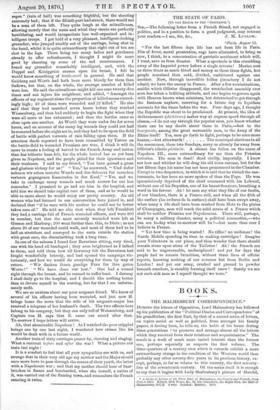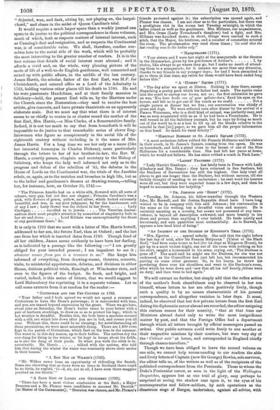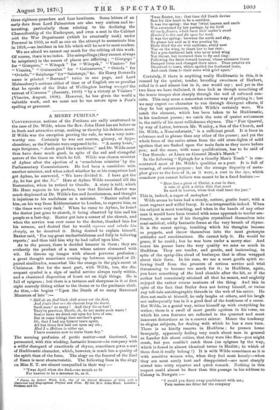BOOKS.
—4-- THE MALMESBURY CORRESPONDENCE.• DURING the leisure of Opposition, Lord Mahnesbury has followed up his publication of the "Political Diaries and Corre,spondence " of his grandfather, the first Earl, by that of a second series of letters, on topics social as well as political, from amongst his family papers, it having been, he tells us, the habit of his house during three generations " to preserve and arrange almost all the letters which they received from their relations and acquaintances." The result is a work of much more varied interest than the former one, perhaps especially as respects the first volume. The three-quarters of a century over which it extends exhibit a more extraordinary change in the condition of the Western world than probably any other seventy-five years in its previous history, ex- cept, perhaps, so far as relates to this country, the first seventy- five of the seventeenth century. Of the series itself it is enough to say that it begins with Lady Shaftesbury's picture of Handel,
• d Series of Letters of the First Earl of Malmestnery, Ms Family and Friends, from 1745 to 1870. Edited, with Notes, &c., by his Grandson, the Right Hon. the Earl of Idalmesbury, G.O.B. 4 vols. London: Bentley. 1870.
" dejected, wan, and dark, sitting by, not playing on, the harpsi- chord," and closes in the midst of Queen Caroline's trial. It would require a much larger apace than a weekly journal can spare to do justice to the political correspondence in these volumes, much of which, both as respects matters of internal interest, such as Canning's duel and resignation, and as respects the Continental war, is of considerable value. We shall, therefore, confine our- selves here to the social side of the work, which will be probably the most interesting to the greater number of readers. It is in the first volume that details of social interest most abound ; and it affords a vivid and, on the whole, very pleasing picture of the mode of life of a well-to-do English gentleman, well connected and mixed up with public affairs, in the middle of the last century.
James Harris, the scholar, father of the first Earl, was M.P. for Christchurch, and entered office as a Lord of the Admiralty in 1762, holding various other places till his death in 1780. He and his were passionate Handelians, and at their family mansion in Salisbury—held, the present Earl tells us, by the Harrises under the Church since the Restoration—they used to receive the best artists, give concerts, and have private theatricals on an apparently elaborate scale. But we must say that what there is of interest seems to us chiefly to centre in or cluster round the mother of the first Earl, Mrs. Harris,—a Miss Clarke, of a Somersetshire family.
Indeed, it is not too much to say that from henceforth it will be impossible to do justice to that remarkable series of clever Eng- lishwomen who figure so conspicuously in the social life of the eighteenth century without including in it the name of Mrs.
James Harris. For a long time we see her only as a name (like her immortal homonym in Charles Dickens), more particularly through the letters to her of her brother-in-law, the Rev. W. Harris, a courtly parson, chaplain and secretary to the Bishop of Salisbury, who keeps the lady well informed not only as to the progress and defeat of the rebellion of '45, the debates in the House of Lords on the Continental war, the trials of the Jacobite rebels, or, again, as to the matches and breaches in high life, but as to the ladies' and gentlemen's dresses at drawing-rooms,—telling her, for instance, how, on October 80, 1745 :—
" The Princess Amelia had on a white silk, flowered with all sorts of colours, very gay, but not fine nor elegant ; Princess Caroline's was a pink, with flowers of green, yellow, and silver, which looked extremely beautiful, and was, in my poor judgment, by far the handsomest suit
of any I saw ; Lady Gower was the richest in her dress Lady
Cardigan. excelled as to jewels The Venetian Ambas- sadress drew moat people's attention by somewhat of singularity both in her air and dress Lord Kildare was unexceptionably the finest of any gentleman there," &c.
It is only in 1763 that we meet with a letter of Mrs. Harris herself, addressed to her son, the future Earl, then at Oxford ; and the last one from her which is inserted dates from 1780. Though fond of all her children, James seems evidently to have been her darling, as is indicated by a passage like the following :—" I am greatly obliged for your intended present ; I am impatient to see it ; whatever comes from you is a treasure to me." She keeps him informed of everything, from drawing-rooms, theatres, concerts, visits, to ministerial appointments, debates, and divisions in either House, dubious political trials, Ranelagh or Winchester riots, and even to the figures of the budget. So fresh, and bright, and varied, indeed, is this series of letters, that we would suggest to Lord Malmesbury the reprinting it in a separate volume. Let us cull some extracts from it at random for the reader :— " Corranum AND THE FEN-Courrar IN 1763.
"Your father and I both agreed we would not spend a summer at Cottenham to have the Dean's parsonage; it is surrounded with fens, and you are teased beyond expression by the gnats. When we gothere, about nine on Saturday, the Dean's butler came to your father with a pair of leathern stockings, to draw on so as to protect his legs; which in hot weather is dreadful. Besides this, the beds have a machine covered with a silk net which lets down after you are in bed, and covers you all over. Without this, there could be no sleeping; for notwithstanding all these precautions, we were most miserably stung. There are 1,400 cows kept in the parish of Cottenham, which feed on the fens in the summer. The water is, in this dry season, up to their bellies. The natives dry the cow-dung for firing in the winter, so 'tis kept in heaps about the fields, as is also the dung of their yards. So when you walk the stink is in- conceivable. Mr. Harris talked with the natives, who told him that during the winter the water was constantly above their ancles in their houses."
" A BON MOT OF WILKES'S (1763).
"Mr. Wilkes never loses an opportunity of ridiculing the Scotch. Some one observing that as there were no trees in Scotland there could be no birds, he replied, ' G—d, sir, not at all, I have seen three magpies perched on one thistle.' " "A BATH RIOT OF LADIES AND GENTLEMEN (1769).
"There has been a most violent combustion at the Bath ; a Major Brereton and a Mr. Plower were candidates to succeed Mr. Derrick" [as Master of the Ceremonies]; "Brereton was chosen, and Mr. Plomer'a friends protested against it; the subscription was opened again, and Plainer was chosen. I am not clear as to the particulars, but there was a prodigious riot in the rooms last Tuesday se'nnight, in which the Ladies joined as well as the gentlemen. Mrs. Hillman, our acquaintance, and Mrs. Orme (Lady Townshend's daughter) had a fight, and Mrs. Hillman was knocked down ; in short, things were carried to such a pitch, that the Mayor, his brethren, and a number of constables entered the room. The proclamation was read three times ; 'tis said that the last reading was to the ladies only."
MisQuEBADRs (1771).
" Your sisters and I were last night at the masquerade at the theatre
in the Haymarket, given by the gentlemen of Arthur's I, by choice, like always to go where they go, but I make no merit of attend- ing them to a masquerade, for it amuses me more than any diversion, thanks to my friends in my younger days; for had I been permitted to go to them at that time, my relish for them would have been ended long before this."
" A 'HORSEY ' SWIM (1771).
"The day after we spent at Dinton. Nothing is done there, except disparking a pretty park which his father had made. The squire came into the court to survey our horses, not us ; the first salutation he gave us was, 'You have broke one of your splinter-bars,' fixed his eyes on the horses, and left us to get out of the coach as we could Not a single person at dinner but we five ; our conversation was chiefly of grass and dogs. We were relieved soon after dinner by the arrival of a Parson Waterman, who is a droll kind of animal, was perfectly easy, and was as soon acquainted with us as if he had been a Frenchman. He is well versed in all the Salisbury journals, but he says by living so much out of the world he is at a loss to fill up all the blanks relative to the scandal in that [sic] paper, so we gave him all the proper information on that head. So much for rural felicity !"
"HIGHWAY ROBBERY IN Sr. James's SQUARE (1773).
"A most audacious fellow robbed Sir Francis Holburne and his sisters in their coach, in St. James's Square, coming from the opera. He was on horseback, and held a pistol close to the breast of one of the Miss Holburnes for a considerable time. She had left her purse at home, which he would not believe. He has since robbed a coach in Park Lane."
•
"Lamle' FEATHERS (1775).
"Lady Harriet Stanhope has lately been in France with Lady Ailesbury and Mrs. Dames ; they have returned in fine feathers, but the Duchess of Devonshire has still the highest. One lady tried all places to get one longer than the Duchess, but without success, till she luckily thought of sending to an undertaker ; he sent word his hearses were all out, but they were expected home in a few days, and then he hoped to accommodate her ladyship."
" DR. JOHNSON AND Bozzr' (1775).
"Tuesday, Dr. Johnson, his fellow-traveller through the Western Isles, Mr. Boswell, and Sir Joshua Reynolds dined here. I have long wished to be in company with this said Johnson; his conversation is the same as his writing, but a dreadful voice and manner. He is certainly amusing as a novelty, but seems not possessed of any bene- volence, is beyond all description awkward, and more beastly in his dress and person than anything I ever beheld. He feeds nastily and ferociously, and eats quantities most unthankfully. As to Boswell, he appears a low-bred kind of being."
"AN INCIDENT OF THE DUCHESS OF KINGSTON'S TRIAL (1776).
"Mrs. Egerton . . . . spared nobody. She said that the night before the last day of trial, after Sir Francis Molyneux " [Usher of the Black Rod] "had been some hours in bed (for he slept at Kingston House), he got up in a most violent fright, ran out of his room with nothing on but his shirt, caught a housemaid in his arms, crying oat, The Duchess is gone off I' The maid said he might see the Duchess, for she was not undressed, as the Councillors bad just left her, but recommended his patting on some other garment. So, in his hurry, he threw his powdering dress over his shoulders, and went to the Duchess's room, after which he went down and saw that all his tall beastly fellows were on duty,' and then went to bed again."
We will extract no further, but simply add that the reflex action of the mother's fresh cheerfulness may be observed in her son himself, whose letters to her are of ten positively lively, though such a quality is by no means characteristic of his general correspondence, and altogether vanishes in later days. It must, indeed, be observed that but few private letters from the first Earl duirng his diplomatic career abroad are recorded, the editor assigning this curious reason for their scarcity, " that at that time our Ministers abroad dared only to write the most insignificant matter by post, and that the Foreign Office had a department through which all letters brought by official messengers passed an ordeal. Our public servants could write freely to one another at their respective missions by their couriers, but were very shy of the Cabinet noir ' at home, and corresponded in England chiefly through chance travellers."
Though we have been obliged to leave the second volume on one side, we cannot help recommending to our readers the able and lively letters of Captain (now Sir George) Bowles, sole survivor, the editor tells us, of the writers as well as of the recipients of the published correspondence from the Peninsula. Those to whom the Duke's Peninsular career, as seen in the light of the Wellington Despatches, appears but as one trail of glory, may perhaps be surprised at seeing the shadow cast upon it, to the eyes of his contemporaries and fellow-soldiers, by such operations as the disastrous siege of Burgos, undertaken, against all advice, with three eighteen-pounders and four howitzers. Some letters of an early date from Lord Palmerston are also very curious and in- teresting, particularly those relating to his declining the Chancellorship of the Exchequer, and even a seat in the Cabinet with the War Department (which he eventually took) under Perceval in 1809, as well as one on the attempt to assassinate him in 1818,—an incident in his life which will be new to most readers. We are afraid we cannot say much for the editing of. this work. Of course, there is no index. The misspellings (they cannot always be misprints) in the names of places are afflicting ; " Giurgego " for " Giurgevo," " Witspek " for " Witepsk," " Vimiero" for " Vimeira," ".Guimeralns " for " Guimaraens," " Ovieda " for "Oviedo," " Sainborge " for " Saintonge," &c. Sir Harry Burrard's name is printed " Burrand" twice in one page, and Lord Malmesbury's notions either of time or of English are so peculiar that he speaks of the Duke of Wellington having avenged the retreat of Corunna " (January, 1809) " by a victory at Vimiero " (Vimeira, August, 1808). However, he has given the world a valuable work, and we must not be too severe upon a Peer's spelling or grammar.
































 Previous page
Previous page